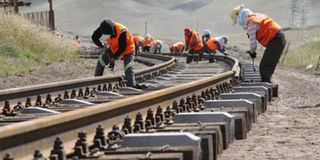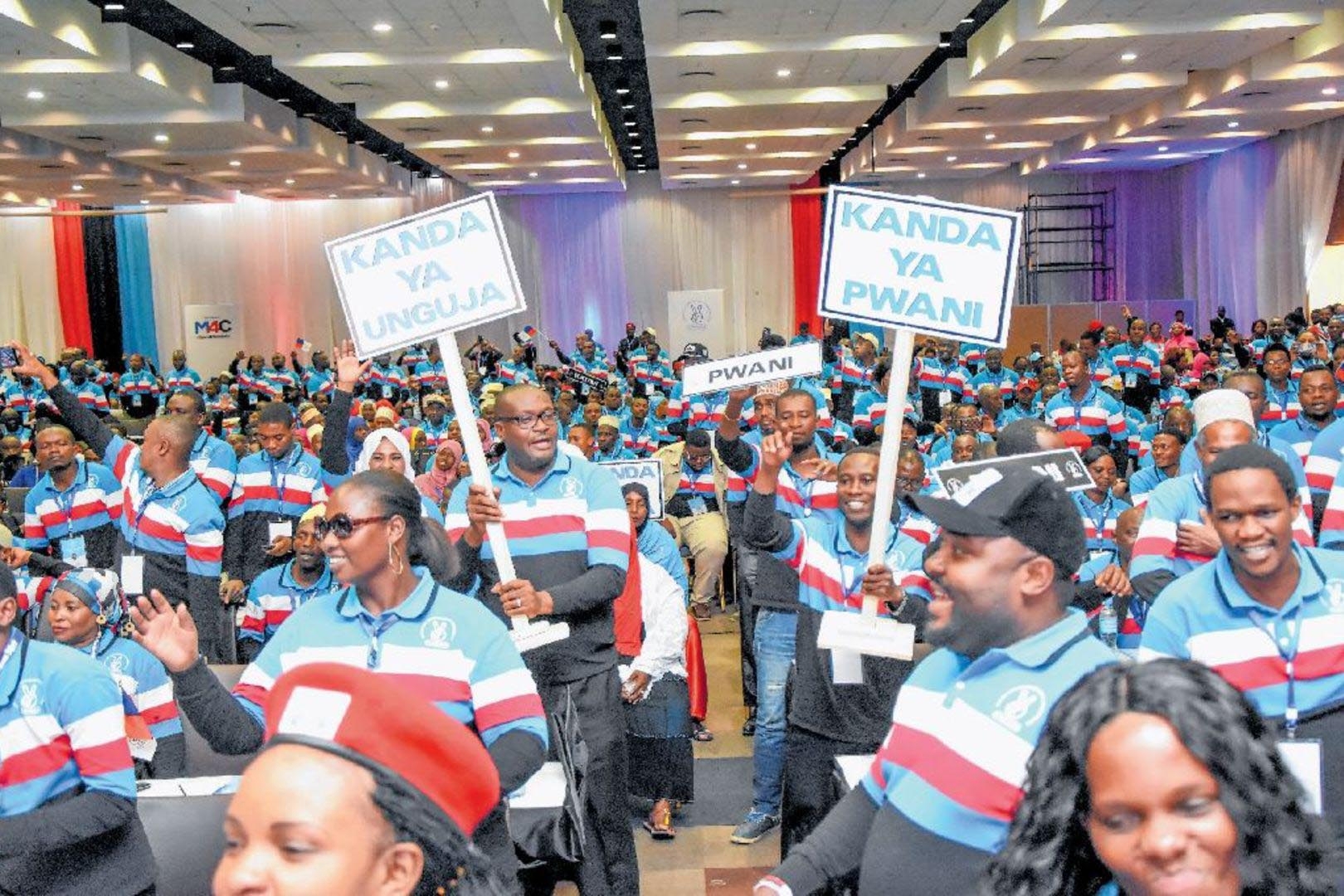Tanzania’s SGR completion concerns rise amid broken promises

What you need to know:
- The journey, fraught with unmet promises and financial constraints, has left segments of the railway unfinished and workers in limbo.
Dar es Salaam. As Tanzania's ambitious Standard Gauge Railway (SGR) project inches towards completion, a cloud of uncertainty looms over its progress.
The journey, fraught with unmet promises and financial constraints, has left segments of the railway unfinished and workers in limbo.
From the bustling streets of Dar es Salaam to the serene landscapes of Morogoro, the SGR's promise of modern transportation infrastructure has faltered.
Initial projections of completion within 30 months have given way to delays, with the first segment requiring an additional 18 months.
As deadlines slip and milestones remain unmet, questions arise about the government's ability to deliver on its commitments.
Amidst these challenges, the plight of the workers underscores the project's broader struggles. Dismissals from project sites, attributed to a lack of funds for payments, have left hundreds without livelihoods. The echoes of broken promises reverberate through the camps, where uncertainty prevails.
Committee expresses doubts
Doubts about the completion of the Isaka-Mwanza segment were also expressed by the Permanent Parliamentary Committee on Infrastructure.
In its report to parliament in Dodoma on April 6, 2024, the committee's chairman, Mr Selemani Kakoso, questioned whether the segment would be completed on time.
The basis for his doubt is the nearing end date of the project, which is May 14 of this year, while the completion progress stands at 54.01 percent.
Apart from these doubts, the committee's report on the same day, when parliament discussed and passed the estimates of revenue and expenditure of the ministry of Transport for the fiscal year 2024/25, stated that the government had paid the contractor Sh1.343 trillion, equivalent to 40.53 percent of the project's cost.
"The committee doubts the remaining time to complete the relevant project by May 2024 compared to the remaining percentage of construction. The government informed the committee that they hope the contractor will complete the construction because the remaining work is not significant compared to the work already done," he said.
However, the scheduled completion date for the project has already passed, and according to our findings the work has not been completed.
According to Mr Kakoso, the committee's report has found complaints from citizens due to non-payment of compensation after their land was acquired for the project. He recommended that the government ensure payment of compensation to these citizens by the law.
Financial challenges
Delays in the project, along with others related to the SGR, are attributed to financial challenges that the government faces in paying the contractor, CCECC from the People's Republic of China, to complete the work.
This is confirmed by some workers in various project camps who complain of being laid off because, as they were told by the contractor, the government lacks funds to pay them.
One of the workers at the Isaka-Mwanza segment (whose name is withheld) said that in their camp, they started with over 400 workers, but now only 50 remain.
In their Luvumbo camp, the workers said the reduction of staff began on April 20, 2024, when more than 100 people were laid off.
According to the worker, the downsizing continued until it reached him, and now only 50 workers remain in the camp.
"We were laid off on Friday (May 24), leaving about 50 of us, and even the vehicles have started to be removed, indicating that the project is stalled," he explained.
The reason for their dismissal, he explained, is that they were informed by the human resources department that there were financial challenges preventing payment.
"The HR passed by and told us that the government doesn't have the money to pay the contractor to continue the work, so we've been asked to go home for a month, and then they promised to bring us back," he said.
Regarding payments for terminated contracts, he explained that for those with three-month contracts, the contractor has promised to pay an additional four days.
However, for those who have worked for more than six months, he said they are paid a year's worth of vacation pay at a rate of Sh16,600 per day.
He said this move is a blow to him because it happened suddenly, although some workers are still at the camp, he has decided to leave due to a lack of funds to support himself.
Mwananchi contacted the Human Resources manager of Yepi Merkez, who refused to give his name, directing the reporter to speak with a spokesperson, as it is not in his authority to speak on behalf of the company.
"I cannot comment on that; please find someone from communications or the project manager," he said.
Even when contacted, the spokesperson's phone rang unanswered.
However, when the project manager was reached, he claimed to have already left before the letter was distributed to other workers.
Makutopora-Tabora section also in crisis
Others affected by this situation are those working on the Makutopora to Tabora section, which is 368 kilometres long.
According to one of the workers, they were informed that there would be no work in that area until they received a phone call, and since September last year, more than 1,000 people have been laid off.
In this SGR section, implemented by the contractor Yapi Merkezi, the worker claims the reason for their dismissal is the government's lack of funds to pay the contractor.
A notice from Yapi Merkezi issued on May 23, 2024, directed all workers as follows:
"Starting May 23, 2024, there will be no work until you are notified by the human resources department and the relevant department heads to return to work. Please make sure your phone is available at all times."
The worker emphasised that the contractor informed them that they did not have money because their employer (the government) had run out.
"Yapi Merkezi has told us they don't have money; the government has run out of funds to continue with the project. The situation is not good; many projects are struggling. I've been in touch with my colleagues, and it's dire; many people have been sent home. I've been suspended since February," he said.
Another worker on the project said he saw the announcement at a time when he had already been laid off since February 2024.
"We ask the government to pay Yapi Merkezi; we have no work to do. I'm just at home now; I've been told I'll receive a phone call, but I don't know what will happen; maybe this is the end of our jobs," he said.
The Makutupora-Tabora section costs Sh4.606 trillion, and it is expected to be completed within 42 months from April 2022.
Government pledges to continue work
Despite this reality, in his speech on May 6, 2024, the Minister of Transport, Professor Makame Mbarawa, said the government is continuing with the construction of the entire project, which consists of two phases totalling a network of 2,809 kilometres.
In addition to these phases, the minister said the government will continue with the construction of the railway in other areas of the Southern and Northern Corridor as resources become available.
In his discussions, Professor Mbarawa said the search for funds from stakeholders, including investors through public-private partnerships (PPP), is ongoing.
According to Mbarawa, this cooperation aims to facilitate the construction of the railway in the remaining areas, including from Kaliua – Mpanda – Karema (321 kilometres), Isaka – Rusumo – Rwanda (371 kilometres), Mtwara – Mbambabay and branches of Liganga and Mchuchuma (1,000 kilometres).
Other sections include Tanga – Arusha – Musoma (1,028 kilometres), Dar es Salaam City Railway (166 kilometres), and Dodoma City Railway (107 kilometres).
He explained the significant need for funds for the implementation of transport projects, which require large amounts of capital. For example, the SGR project will cost approximately Sh23 trillion to complete.
Apart from his explanations on May 6 of this year, Mwananchi has been trying to contact Professor Mbarawa to address all these claims, his phone rang unanswered.
Even when sent a text message and reached via WhatsApp, it showed that the message was received, but there was no response.
Alongside him, Secretary General of the ministry, Professor Godius Kahyarara, was also contacted; he answered and claimed to be in a meeting and said he would call back later.
Until the publication of this news, the ministry's top executive did not contact the journalist again, and even when his phone was called, it went unanswered.





